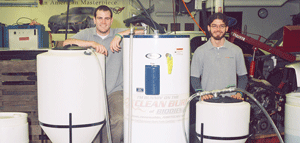January 2007
 View Full Print Edition
View Full Print EditionBusiness Briefs
Columns

A Review of Stock Repurchase Programs
By Thomas D. Johnson

The Way I See It
By Mike Bryan
View From the Hill
By Bob Dinneen

Legal Perspective
By Todd J. Guerrero and Mark J. Hanson
Talking Point
By Frank Schoneveld and James Arneill

Editor's Note
By Tom Bryan
Featured

Conversation and Collaboration
By Holly Jessen
The ethanol industry is poised to take a giant leap, as techniques to commercialize cellulosic production methods move closer to becoming a reality. But the old saying, "Look before you leap," was one of the messages that came out of two recent conferences focused specifically on the developing cellulosic ethanol industry. Challenges, such as securing project financing, manufacturing cheaper enzymes, producing more flexible-fuel vehicles, and developing the blending and pumping infrastructure for renewable fuels, still loom large, leaving plenty of opportunities for more dialogue and collaboration.

The Great Biomass Inquisition
By Ron Kotrba
Massive efforts are underway to optimize techniques designed for processing biomass. But even a perfectly efficient conversion doesn't mean much if the materials can't be delivered cost-effectively and in large quantities to a refinery.

The Discoverer's Game
By Nicholas Zeman
The world of enzyme technology is filled with explorers scouring the ends of the Earth for new strains of fungi. In the wake of new discoveries is a world of intellectual property intrigue and business maneuvering that has leading enzyme producers—Genencor, Novozymes and Dyadic—aligning with different partners in a race to build the first industrial cellulosic biorefinery.

Riding the IPO Wave
By Nicholas Zeman
Many ethanol companies are successfully attracting investors now, which was still a considerable challenge a year ago. Discovering another financial option, a handful of ethanol producers and future producers filed initial public offerings in 2006, and in the beginning, many were riding high. Although share prices have cooled considerably since last summer when ethanol prices were being shored up by $75 a barrel crude oil prices, some market analysts say that volatility is to be expected in a business that's still in its infancy.

Recipe for Success
By Lindsey Irwin
Passion, patience and persistence have paid off for BlueFire Ethanol as the company prepares to launch its first U.S. cellulosic ethanol production facility using technology that's been proven in the Japanese market. The company intends to build on its success by erecting cellulosic ethanol plants within Waste Management landfill sites across the United States. The road to this point has been long and tumultuous but BlueFire Ethanol has vowed not to let up until it reaches the finish line.

Heavyweights Enter the Ring
By Ron Kotrba
Some heavy hitters have been tapped to join the research efforts to commercialize cellulosic ethanol production. Ethanol producers hope that matchups with companies such as DuPont or Chevron will give them the added punch they need.
There has been a resurgence of domestic interest in whether or not U.S. feedstocks customarily used to refine sugar—sugarcane and sugar beets—would make good candidates as ethanol feedstocks, as well. EPM takes a detailed look at the U.S. sugar market to see if it's economically feasible.

First to Be the First
By Holly Jessen
After decades of research and development ifocused on using enzymes to break down fiber, Iogen Corp. is poised to build what could be the industry's first industrial-scale cellulosic ethanol plant. The Canadian-based company has operated a 1 MMgy demonstration facility since the spring of 2004, and says it's now ready to begin building a commercial-scale plant sometime in 2007.
Aggressive Comfort
By Nicholas Zeman
Having been credited with backing the construction of the ethanol industry's first generation of plants, executives with Denver's CoBank talk with EPM about funding such a rapidly growing and changing industry. As far as cellulosic ethanol projects are concerned, it's not a matter of if the institution will finance them, but when.

Getting Down and Greasy
By Holly Jessen
Thanks to a growing start-up company, residents and restaurant owners in Loveland, Colo., can choose a more environmentally responsible method to recycle used cooking oil. Rocky Mountain Sustainable Enterprises is collecting a substance few want, or even know what to do with, and preprocessing it for biodiesel production at an area plant.

Sustainably Securing the Home Front
By Nicholas Zeman
As American soldiers continue to hold their position in turbulent foreign environments, at home the U.S. armed forces have been striving to reduce their petroleum footprint by employing biodiesel in non-tactical applications.

The Long Haul
By Holly Jessen
Widespread acceptance of biodiesel by the trucking industry would certainly grease the wheels of the biofuels industry. Biodiesel advocates are gaining ground with many truck drivers and trucking companies, but the campaign has just begun.

Total Package Fleet
By Ron Kotrba
How can trucking firms of all sizes avoid volatile diesel prices and at the same time protect the environment? That's easy-by producing clean-burning, renewable fuel themselves.
B20: A Ram-Tough Blend
By Ron Kotrba
It's been a year since DaimlerChrysler announced its support of B20 for use in 2007 Dodge Ram fleet trucks. Now Biodiesel Magazine speaks with the automaker and Detroit-based nonprofit NextEnergy about how this approval might fit in with the development of an industry-accepted B20 quality standard.
Contributions

Corn: The Structure of a Bullish Market
By Darin Newsom

















